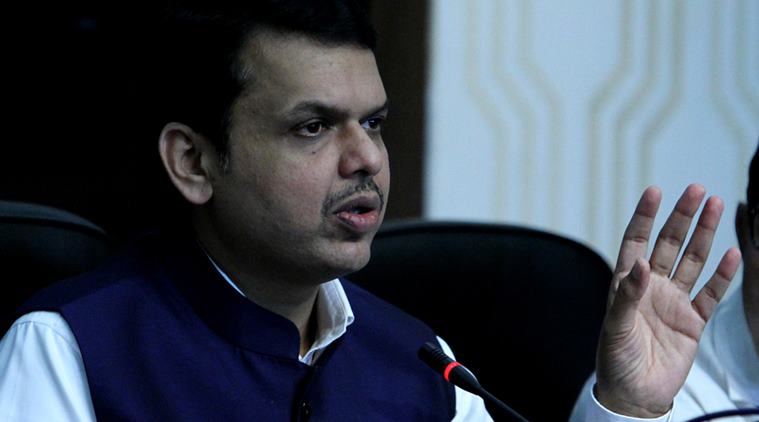
One of the main complaints against the draft Maharashtra Protection of Internal Security Act (MAPISA) — termed “draconian” and a potential harbinger of “police raj” — is the absence of representation of the political opposition in the State Internal Security Committee, the apex body in charge of monitoring the implementation of the law.
It has now emerged that an earlier version of the draft law did, in fact, include leaders from the opposition in the Internal Security committee. There were several other checks and balances as well, all of which were removed in the new draft, which was drawn up within months of the Devendra Fadnavis government taking over at the end of October 2014.
The Indian Express has accessed a copy of the original draft, in which its architects — a committee of nine IPS officials — had suggested including the Leaders of Opposition in both the Vidhan Sabha and Vidhan Parishad in the governing body under the Act.
When contacted, Chief Minister Devendra Fadnavis denied knowledge of the original draft, saying he had “no information”.
This first version of the Bill — which took seven months to draw up — is a comprehensive 70-page document divided into nine chapters, defining Standard Operating Procedures (SOPs) mandated by law, the accountability of each administrative wing of the government, and including stakeholders in the legislature, municipal and local bodies, corporations, and state boards.
No internal security SOP is currently mandated by law — a bunch of them is spread across different departments, with no unified command, and laying down no specific accountability.
The new draft — a much lighter 16 pages — was released on August 21. A six-member governing body led by the home minister is mandated to define the guidelines for internal security, examine emerging intelligence inputs, and summon any official of any government department or local authority for a briefing.
The first draft had been in the making at the office of the Director General of Police from April 2014. Then DGP Sanjeev Dayal, the three heads of the law and order portfolio (KL Bishnoi and Deven Bharti for the state, and Sadanand Date for Mumbai), Commissioner, Intelligence Rashmi Shukla, IG, Establishment K Venkatesham, and several other IPS officers collected inputs from the ground.
The entire draft was researched and put together by Atulchandra Kulkarni, who had just returned from his posting at the Intelligence Bureau. Kulkarni visited several government departments to study their internal security needs, and to update the current status of preparedness and resources available with the government. Kulkarni is currently head of the Maharashtra Anti-Terrorism Squad.
The biggest takeaways from the first version were the inclusion of key security shortcomings noticed during the 2008 Mumbai terror attacks, as officially recorded in the Ram Pradhan Committee report, and a special emphasis on a state government-designed Witness Protection Scheme.
Based on learnings from the ground and a study of measures taken in western countries, the draft Bill included aspects like a two-year watch on the activities of terrorists after release from incarceration.
What the new draft calls State Internal Security Committee — the top decisionmaking body — the original draft had called the State Security Advisory Board (SSAB), with the chief minister as its chairman.
Section 1 in Chapter II of the draft — ‘Constitution of State Security Advisory Board’ — said the new body would be independent of the existing State Security Commission, and would include among its 11 members the Leader of Opposition in Vidhan Sabha, Leader of Opposition in Vidhan Parishad, the deputy chief minister, home minister, finance minister, chief secretary, additional chief secretary (Home), the state DGP, Mumbai Police commissioner, and the commissioner, State Intelligence Department (SID).
The current draft, by contrast, has done away with five of the 11 suggested posts in the apex body — and has the home minister, chief secretary, additional chief secretary (Home), DGP and Mumbai Police commissioner as members, and the commissioner, SID, as member secretary. The Home portfolio is currently with Chief Minister Fadnavis.
At a press meet last week, responding to a question on why the opposition was not included in the working of an intelligence- and security-related Act, K P Bakshi, ACS (Home) had said, “Nowhere is the opposition updated on intelligence alerts or any such sensitive subjects.” On Saturday, the chief minister, responding to the public outcry over “draconian clauses” and police restrictions, said the government would rework the draft Bill.
According to officials, the drafting committee had submitted the first draft to Chief Minister Fadnavis in November 2014, who had asked the Home department to put it up for discussion among various stakeholders. Officials said the file was finally put up, after a second reminder, in January 2015, and meetings were called from February.
The various stakeholders, overseen by the Home and Judiciary departments, included officials from the Education (there was special emphasis on building resilience against attacks right from the school and college stage), Power and Energy, Health, and Finance departments, corporations, maritime bodies, etc.
In the new draft, all responsibilities of all departments and stakeholders — barring the role of the police — have been removed.
The original draft defined the role of a Security Sub-Committee (SSC) to review security arrangements in public and private areas, including large private commercial establishments, residential colonies, schools, hospitals, water reservoirs, water supply schemes, etc. Roles and detailed mitigation strategy were defined, covering the role of the Fire Brigade, Health department and its hospitals, municipal shelters, transit camps, transport establishments, municipal corporations, nagar panchayats and industrial townships.
All chapters and clauses around them have been removed in the new draft, and no clear accountability remains.
Asked for a reaction, Fadnavis said, “I don’t have information about draft of 2014, which you are mentioning.”
He added: “Whether it’s that draft or this draft, it has not come for the consideration of Cabinet or government as yet. The draft was shared by the department for suggestions and objections. A very premature discussion was started with many misinterpretations. That is why I have directed the ACS Home to withdraw that draft from public domain. A comprehensive draft will be prepared and put up before all-party meeting and after broad consensus it will be placed before Cabinet and then for public suggestion and objections. Based on that a draft will be finalised by Cabinet and placed before legislature. Since there is no discussion or decision of government, it’s a very premature discussion.”
[source;indianexpress]





















